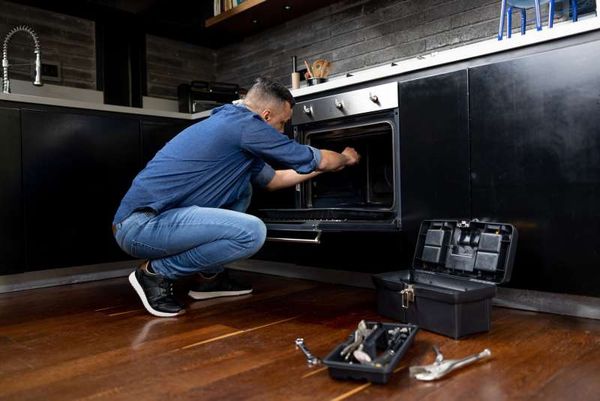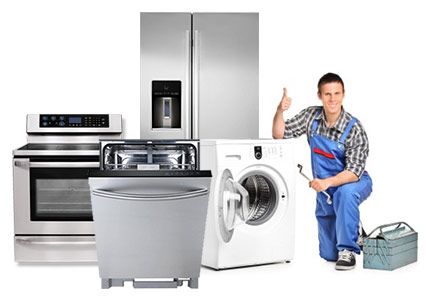The Ultimate Guide to Understanding Appliance Repair in the house
When your refrigerator stops cooling or your oven declines to warmth, it can really feel frustrating. Understanding appliance repair work in the house can save you money and time. You'll learn to identify signs and symptoms, use important tools, and follow a methodical troubleshooting procedure. Yet prior to you begin, there are crucial safety preventative measures you need to consider. What are one of the most usual issues, and exactly how can you repair them? Let's discover the basics.
Typical Device Troubles and Their Signs and symptoms
When your appliances start breaking down, it's crucial to identify the indicators early. Neglecting them can cause larger issues and pricey fixings. If your refrigerator isn't cooling correctly, you may discover cozy places or condensation creating. This might show a stopping working compressor or an obstructed vent.Your dishwashing machine may show problems with dirty recipes or unusual sounds throughout cycles. If you hear grinding or clanking, it's time to investigate.A cleaning device that will not rotate or drain can leave you with soaked washing, suggesting a stopped up drainpipe or a malfunctioning pump.Lastly, if your stove's temperature level seems off or it takes for life to pre-heat, you may be managing a damaged thermostat. By remaining alert to these signs and symptoms, you can resolve concerns prior to they escalate into significant repair work.
Vital Devices for Home Appliance Repair Work
When you're taking on home appliance repairs at home, having the right tools is crucial. Standard hand tools like screwdrivers and pliers will help you disassemble and take care of numerous home appliances, while electrical screening gadgets guarantee you're functioning securely with circuitry. Allow's review what you need to get going on your repair trip.
Fundamental Hand Devices
Having the right devices is important for effective home appliance repair work in your home. Start with a trusted screwdriver collection, including both flathead and Phillips kinds, as screws prevail in device setting up. Pliers are also important; they assist with gripping, turning, and cutting cables or small parts. A pair of needle-nose pliers can get to difficult situations quickly. You'll need a great flexible wrench for tightening up or loosening up nuts and screws. An energy knife comes in handy for puncturing product packaging or insulation. Lastly, do not forget a durable workbench or surface to securely organize your devices and parts. With these basic hand devices, you'll be well-prepared to deal with most appliance repair work that come your means.
Electric Screening Instruments
Along with standard hand tools, electrical screening devices play a crucial duty in device fixing. These tools aid you identify electrical concerns and guarantee home appliances work safely. A multimeter is important; it measures voltage, present, and resistance, allowing you to determine problems quickly. A non-contact voltage tester is another essential, letting you detect online wires without making straight contact, boosting your safety and security. Secure meters are terrific for determining current flow in wires without detaching them, conserving you effort and time. Furthermore, circuit testers can rapidly examine if outlets are working appropriately. By utilizing these gadgets, you'll streamline your troubleshooting process and improve your repair abilities, making appliance upkeep a great deal much easier.
Step-by-Step Overview to Diagnosing Home Appliance Issues
When your home appliance acts up, it can be frustrating, yet detecting the concern doesn't need to be frustrating. You'll discover to identify typical troubles and apply reliable troubleshooting strategies. Allow's stroll through the steps to get your appliance back in working order.
Common Device Issues

Repairing Techniques Clarified

Repairing Significant Kitchen Area Home Appliances: A Closer Look
Have you ever before asked yourself exactly how to deal with usual problems with your cooking area appliances? Repairing significant cooking area devices like fridges, stoves, and dishwashing machines can be easier than you assume. Beginning by determining the problem-- whether it's a fridge not cooling down or an oven that won't heat. Frequently, a straightforward reset or examining the power resource can resolve the check here issue.For fridges, clean the condenser coils and examine the door seals. If your stove's not heating, evaluate the home heating component and thermostat. Dish washers might just require a tidy filter or a reset to obtain them back in activity. Always unplug the device before diving into repair work to ensure your safety.Don' t forget to seek advice from the user guidebook for particular fixing suggestions associated with your model. With a little bit of perseverance and the right tools, you can with confidence deal with appliance repair work and save money in the process!

Fixing Washing Devices: Tips and Techniques
When your laundry appliances start acting up, it can really feel frustrating, yet troubleshooting them does not need to be a headache. Beginning by checking the power supply. Validate the device is connected in and the outlet is operating. Next, examine the door or cover switch; a faulty button can prevent the maker from operating.For washers, if it's not spinning, examine for unbalanced tons. Redistributing the clothes could fix the problem. If your clothes dryer isn't home heating, tidy the dust filter and inspect the vent for blockages.Listen for unusual sounds; they can suggest an issue. If your device is dripping, examine the hoses for fractures or loosened links. File any kind of error codes shown on electronic screens, as they can guide you in determining the concern. Ultimately, get in touch with the individual guidebook for details troubleshooting ideas associated with your design.
Security Preventative Measures to Take Throughout Repair works
Prior to you start any kind of home appliance repair services, it's important to prioritize safety to stop accidents or injuries. Disconnect the appliance or turn off the circuit breaker to guarantee no power reaches it while you function. Use insulated devices to lessen the risk of electric shock. Put on safety goggles and gloves to protect on your own from sharp sides or debris (Washer dryer repair service Dependable Refrigeration).Make particular your work area is clean and well-lit, so you can see what you're doing. Keep youngsters and pets far from the area to stay clear of diversions and prospective dangers. If you're handling gas home appliances, be additional careful; look for leaks prior to proceeding.Take your time, and do not hurry through fixings. If you really feel unpredictable concerning any type of step, it's far better to stop and research study than to presume. Adhering to these preventative measures will certainly assist produce a more secure atmosphere for your DIY home appliance repair work job
When to Call an Expert for Aid
Just how do you know if it's time to call a professional for device fixings? If you have actually tried fundamental troubleshooting without success, it's a clear sign. For example, if your device still won't begin or shows uncommon noises after resetting it, don't think twice to look for expert help.When you discover leaks, smoke, or shedding smells, focus on safety and security and call a pro right away. These issues can cause even more substantial damages or pose dangers to your home.Also, if your device is under warranty, calling a specialist is frequently the most effective course. They can ensure that repair services will not void your service warranty, saving you cash in the long run.Finally, if you're unsure or uncomfortable with intricate fixings, it's a good idea to leave it to the specialists. Bear in mind, tackling challenging problems without the best know-how can bring about expensive blunders. Depend on a specialist when unsure!
Regularly Asked Concerns
Just How Can I Avoid Home Appliance Troubles in the Future?
To stop appliance problems in the future, you need to execute normal upkeep, check for damage, tidy filters, and prevent overloading. Staying proactive will assist expand their life-span and maintain them running smoothly.
What Are one of the most Usual Do It Yourself Home Appliance Fixing Mistakes?
You might forget safety preventative measures, miss repairing steps, or use incorrect devices when trying DIY home appliance repair work. Rushing the process or disregarding maker standards can lead to even more considerable problems and costly errors. Stay client and educated!
Just how Do I Know if a Component Demands Replacement?
You can tell if a part requires replacement by inspecting for unusual sounds, leakages, or irregular efficiency. If the device struggles to operate properly or reveals noticeable damages, it's most likely time for a substitute.
Can I Use Generic Components for Device Fixes?
Yes, you can make use of generic components for home appliance repair services, yet identify they're compatible - Dependable Refrigeration & Appliance Repair Service Dryer repair near me. Common parts may conserve you money, but they can impact performance or durability, so evaluate your alternatives very carefully prior to making a decision
What Warranties Cover Home Appliance Repair Works?
Most home appliance guarantees cover repairs for making defects, however they usually exclude damages from misuse. Examine your service warranty terms meticulously, as some might require using certified service technicians and original components for protection to remain legitimate.
Comments on “How to Check Your Appliance’s Warranty – Dependable Refrigeration & Appliance Repair Service Washer repair near me”